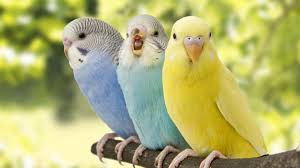
Budgerigar
Conditions of detention
Budgerigars require a comfortable and spacious cage that allows them to fly short distances. The cage should have horizontal bars for climbing, and it’s important to include perches of different sizes and materials to promote foot health. Budgies thrive in environments where they can interact with their owners and other birds.
Useful Fact: Budgerigars are social birds and do well in pairs or small groups, which can prevent loneliness and encourage natural behaviors.
Nutrition and diet
A balanced diet for budgerigars includes high-quality seeds or pellets supplemented with fresh fruits and vegetables. Leafy greens, carrots, apples, and broccoli are excellent choices for a nutritious diet.
Useful Fact: While seeds are a staple, they should not be the sole component of a budgie’s diet, as they are high in fat. A varied diet helps prevent nutritional deficiencies.
Health
Budgerigars are generally hardy birds but can be prone to certain health issues such as respiratory infections, mites, and obesity. Regular veterinary check-ups are important for early detection and prevention of diseases.
Useful Fact: Budgerigars are prone to fatty liver disease, so it’s important to provide a balanced diet and encourage regular exercise.
Grooming and care
Budgerigars groom themselves by preening their feathers, but they also enjoy occasional baths. Providing a shallow dish of water for bathing or gently misting them with water can help maintain healthy feathers.
Useful Fact: Regularly trimming their nails and providing cuttlebone or mineral blocks can help keep their beaks and nails in good condition.
Education and training
Budgerigars are intelligent birds that can be trained to perform simple tricks and mimic sounds. Positive reinforcement and patience are key to successful training.
Useful Fact: Young budgies are more receptive to learning new words and tricks, so starting training early can yield the best results.
Toys and entertainment
Toys are essential for the mental stimulation and well-being of budgerigars. They enjoy a variety of toys, including swings, bells, and puzzles. It is important to rotate toys regularly to keep them engaged.
Useful Fact: Budgerigars enjoy shredding and chewing toys made from natural materials, which can help satisfy their natural foraging instincts.
Safety
Safety considerations include ensuring that the cage is free of sharp edges and that the bar spacing is appropriate to prevent escape or injury. Keep them away from toxic substances, including certain household plants and fumes.
Useful Fact: Avoid using non-stick cookware around budgerigars, as the fumes can be toxic and even fatal to birds.
Accessories
Budgerigars require a variety of accessories for their cage, including perches, food and water dishes, and toys. Accessories should be made from safe materials like untreated wood or stainless steel.
Useful Fact: Natural wood perches help maintain foot health by varying the pressure points on their feet compared to uniformly shaped perches.
Socialization
Budgerigars are social creatures and thrive on interaction with humans and other birds. They should not be kept in isolation for extended periods.
Useful Fact: If you have a single budgerigar, spending time with them daily is crucial for their mental health and well-being.
Travel and Transportation
When traveling with budgerigars, use a secure and well-ventilated travel cage. It’s important to keep the cage covered during transport to reduce stress.
Useful Fact: Familiarize your budgerigar with the travel cage by placing it in their living space and allowing them to explore it before any trips.
Behavior and psychology
Budgerigars exhibit a range of behaviors and vocalizations that indicate their mood and health. Understanding these signals is essential for proper care.
Useful Fact: A happy budgerigar will often sing, chirp, and show interest in its surroundings, while a stressed or unhappy bird may become quiet or exhibit feather plucking.
Legal aspects
In many areas, there are few legal restrictions on keeping budgerigars as pets, but it is important to ensure that any budgerigars purchased are from reputable breeders or pet stores, and not taken from the wild.
Useful Fact: Always check local regulations to ensure compliance with laws regarding pet ownership and breeding.


